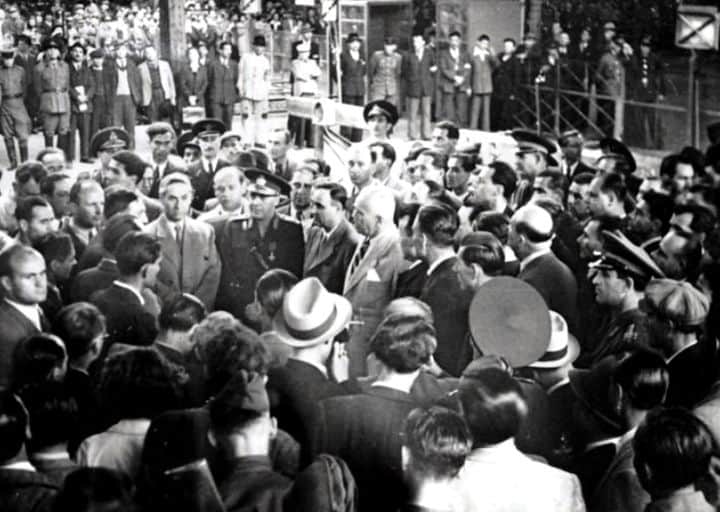By Phil Kohn. Dedicated to the memory of his father, GM3 Walter Kohn, U.S. Navy Armed Guard, USNR, and all men and women who have answered the country’s call in time of need. Phil can be contacted at ww2remembered@yahoo.com.
A constitutional assembly meets in Nanking, China, on November 15, 1946, but is boycotted by the Communists, the Democratic League, and the Social Democratic Party. Dutch and Indonesian representatives come to an agreement mediated by the British at Linggadjati. The Netherlands recognizes the authority of the Republic of Indonesia on the islands of Java, Sumatra, and a portion of Borneo, while retaining colonial control over Sulawesi, the Lesser Sunda Islands, West New Guinea and the Maluku Islands (the Moluccas). They agree to the goal of a United States of Indonesia under the Dutch crown by 1 January 1949.
Universal Pictures releases its historical drama Magnificent Doll on November 16. Directed by Frank Borzage, the film stars Ginger Rogers as Dolly Madison, David Niven as Aaron Burr and Burgess Meredith as James Madison. The movie is not a box-office smash.
Afghanistan, Iceland and Sweden apply to join the UN on November 17. In Mandatory Palestine, three British policemen and a Royal Air Force sergeant are killed when their truck hits a land mine placed by terrorists near Lydda (now Lod) in the central part of the Mandate.
On November 18, a police riot takes place in Tel Aviv, Mandatory Palestine, sparked by the deaths of four Britons the previous day when their vehicle hit a terrorist mine. About 40 British constables of the Police Mobile Force race through the streets, firing into homes, beating up passers-by and shouting “Jewish murderers” and other epithets in a rage over the killings. Around 20 Jewish civilians are injured.
Romania holds general elections on November 19 that are marred by voter fraud and widespread intimidation by the Romanian Army. Initial results show a defeat of the Communists, but returns are stopped without explanation. At the final tally, the Romanian Communist Party claims to have won 79.86% of the votes. Results of municipal elections held in Livorno show that it will be the first major Italian city to be ruled by Communists.
In the East Indies, Dutch forces crush Indonesian resistance on Bali, at Marga, on November 20. In the U.S., 400,000 coal miners go on strike when United Mine Workers president John L. Lewis, defying an injunction, orders them off the job. In Vietnam, a French patrol boat seizes a Chinese junk attempting to smuggle a cargo of gasoline into Haiphong harbor. When the vessels dock, Viet Minh guerrillas capture the patrol boat and its crew. The French Army responds with an ultimatum that the guerrillas have 48 hours to release the patrol boat and its crew or suffer the consequences.
While visiting the U.S. Naval Air Station at Key West, Florida, Harry Truman on November 21 becomes the first U.S. President to travel in a submerged submarine. He is taken 440 feet below the surface in the captured German sub U-2513 and shown a demonstration of the U-boat’s technology. RKO Radio Pictures releases Sam Goldwyn’s production, The Best Years of Our Lives, a film directed by William Wyler about servicemen trying to readjust to civilian life after returning home from World War II. The movie, starring Myrna Loy, Fredric March, Dana Andrews, Teresa Wright, Virginia Mayo and Harold Russell, wins seven Academy Awards, including Best Picture.
The Romanian government on November 22, 1946, announces that “updated” results of its recent general elections show a 90% vote for Communist candidates.
The cousin of Palestine Arab High Commission chairman Fawzi Husseini is murdered in Jerusalem on November 23. Police believe he was killed by Arabs for selling land to Jews. At Haiphong, Vietnam, when the 48-hour deadline for Viet Minh guerrillas to release a captured French patrol boat and its crew passes without compliance, three French gunboats in the harbor — ordered to teach the Vietnamese “a hard lesson” — begin shelling the city. The Vietnamese claim 20,000 soldiers and civilians are killed, while the French say that the number of deaths is “no more than 6,000.”
Tomás Berreta Gandolfo is elected the 32nd president of Uruguay on November 24. (Inaugurated on March 1, 1947, Berreta holds office only five months before dying of prostate cancer on August 2.)
U.S. President Truman creates the Temporary Commission on Employee Loyalty on November 25. It is designed to deal with alleged Communists and disloyal and subversive workers in the federal government. A U.S. federal judge orders the United Mine Workers union to stand trial for contempt of court for the current strike by hundreds of thousands of coal miners. Six states will declare a state of emergency this week, and many schools are closed, for a lack of coal for heating.
At Haifa, Mandatory Palestine, 3,375 Jewish refugees on November 26 resist transfer to a ship transporting them to detention on Cyprus. By the time order is restored, one refugee and one British soldier are dead.
On November 27, at a meeting in New York, the foreign ministers of the U.S., the U.K., the U.S.S.R. and France agree on resolutions to almost all disputed points regarding Trieste. (In January 1947, the United Nations Security Council approves a resolution calling for the creation of a free state of Trieste and the region surrounding it. On September 15, 1947, the Free Territory of Trieste is created. In 1954, the northern part of the territory — including the city of Trieste — is ceded to Italy, while the southern portion goes to Yugoslavia.) In Cuba, Fidel Castro, a law student at the University of Havana, delivers his first major speech, criticizing the corruption and violence of the government of President Ramón Grau.
The National Assembly of France on November 28 meets for the first time under the constitution of the Fourth Republic.




